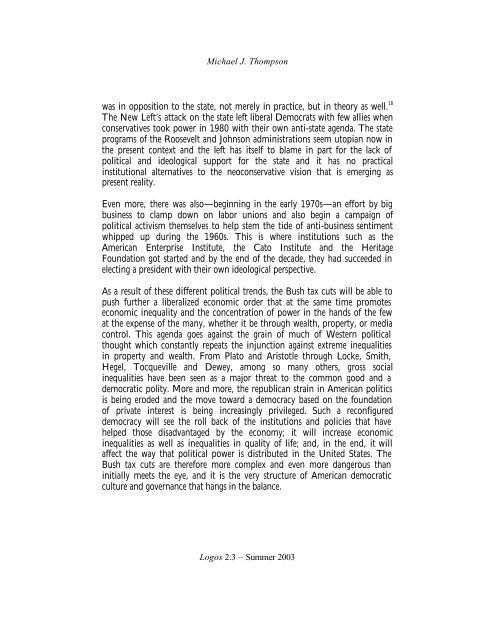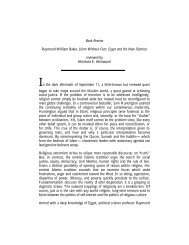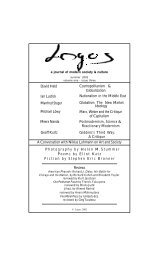Michael J. Thompson Stephen Eric Bronner Wadood Hamad - Logos
Michael J. Thompson Stephen Eric Bronner Wadood Hamad - Logos
Michael J. Thompson Stephen Eric Bronner Wadood Hamad - Logos
Create successful ePaper yourself
Turn your PDF publications into a flip-book with our unique Google optimized e-Paper software.
<strong>Michael</strong> J. <strong>Thompson</strong><br />
was in opposition to the state, not merely in practice, but in theory as well. 18<br />
The New Left’s attack on the state left liberal Democrats with few allies when<br />
conservatives took power in 1980 with their own anti-state agenda. The state<br />
programs of the Roosevelt and Johnson administrations seem utopian now in<br />
the present context and the left has itself to blame in part for the lack of<br />
political and ideological support for the state and it has no practical<br />
institutional alternatives to the neoconservative vision that is emerging as<br />
present reality.<br />
Even more, there was also—beginning in the early 1970s—an effort by big<br />
business to clamp down on labor unions and also begin a campaign of<br />
political activism themselves to help stem the tide of anti-business sentiment<br />
whipped up during the 1960s. This is where institutions such as the<br />
American Enterprise Institute, the Cato Institute and the Heritage<br />
Foundation got started and by the end of the decade, they had succeeded in<br />
electing a president with their own ideological perspective.<br />
As a result of these different political trends, the Bush tax cuts will be able to<br />
push further a liberalized economic order that at the same time promotes<br />
economic inequality and the concentration of power in the hands of the few<br />
at the expense of the many, whether it be through wealth, property, or media<br />
control. This agenda goes against the grain of much of Western political<br />
thought which constantly repeats the injunction against extreme inequalities<br />
in property and wealth. From Plato and Aristotle through Locke, Smith,<br />
Hegel, Tocqueville and Dewey, among so many others, gross social<br />
inequalities have been seen as a major threat to the common good and a<br />
democratic polity. More and more, the republican strain in American politics<br />
is being eroded and the move toward a democracy based on the foundation<br />
of private interest is being increasingly privileged. Such a reconfigured<br />
democracy will see the roll back of the institutions and policies that have<br />
helped those disadvantaged by the economy; it will increase economic<br />
inequalities as well as inequalities in quality of life; and, in the end, it will<br />
affect the way that political power is distributed in the United States. The<br />
Bush tax cuts are therefore more complex and even more dangerous than<br />
initially meets the eye, and it is the very structure of American democratic<br />
culture and governance that hangs in the balance.<br />
<strong>Logos</strong> 2.3 – Summer 2003




